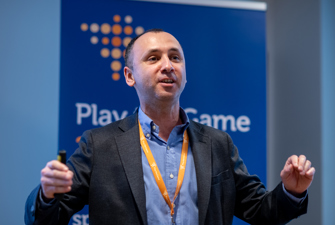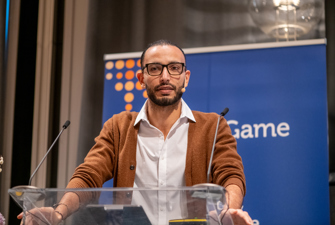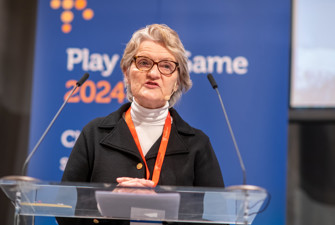The catastrophic impact of normalising corruption in sport
SPEECH: Public prosecutors have joined the fight against corruption in sport, and in a speech on the opening day of Play the Game 2024, Belgian federal prosecutor Frédéric Van Leeuw outlined the need for an international network of prosecutors in the area of sport as a means to counter the multinational businesses sports federations have turned into.
Frédéric Van Leeuw is a federal prosecutor at the Belgian Ministry of Public Affairs.
This text reflects the views of the author.
Ladies and Gentlemen,
I would like to thank the organisers of this conference for inviting me to explain how the phenomenon of sport fraud has come to the forefront of the attention of the Belgian law enforcement.
The battle was not necessarily won in advance: isn't sport the preserve of the private sector?
With the exception of cases where public money is used to attract competitions in order to boost the economy, isn't corruption in sport essentially a matter of a contractual relationship?
In Belgium, there is a loophole in our criminal code that prevents us from prosecuting all aspects of private corruption (see articles 504 bis and ter of the Belgian Criminal Code, which link private corruption to the presence of a legal entity).
Until 1999, Belgian law only covered the corruption of public officials. Today, however, we are aware that the one-off interests of a few corrupt individuals can have far-reaching consequences. So, this is not just a matter of civil contract law, but a matter of public order that deserves the attention of criminal law.
When my colleague Eric Bisschop (who unfortunately left us suddenly one year ago) came to see me in 2014 to convince me to launch the "Zéro" case (fraud in Belgian football known as "football-gate" by the press),that's the question I asked myself.
How could the involvement in this case of an anti-mafia prosecution service such as the Belgian Federal Prosecution Service justify its added value? Didn't we have other things to worry about?
After authorising one test case and then another, I soon had the answer to my question. Of course, corruption in sport seems as old as the hills, but what really caught our attention was the fairly recent trend, in line with the theories of Nobel Prize-winning economist Gary Becker in the 1990s, towards the commodification of sport.
Sport is increasingly becoming an activity in which profit becomes the only factor that supersedes the original intrinsic value of fair play, integrity, surpassing oneself, effort and team spirit in many disciplines.
This danger of mere profit considerations replacing the values that the organisation is intended to promote or defend also exists in the field of justice.
Looking at things solely from a commercial point of view means two things: on the one hand, it means evaluating a situation in terms of profit (not the profit that could be made for the community as a whole, but the profit made by just a few privileged individuals); on the other hand, it means evaluating the situation from a purely quantitative perspective from which all qualitative considerations are excluded" (Paul Jorion, Le dernier qui sorti éteint la lumière, Essai sur l'extinction de l'humanité, Paris, Pluriel, p. 32-33).
****
Ladies and gentlemen, sport is by its very nature a great school of respect and sometimes even an unexpected social lift. The problem is that when, for the first time, we used the techniques of the fight against organised crime to investigate a well-known player's agent in Belgian football, we fell off our chairs.
An important preliminary remark is that this world was absolutely used to being left alone by the law enforcement. So, there were no counterstrategies, and certain behaviours were so commonplace that they were practised openly because they had become the norm.
How many times have we been questioned and been told: "But everyone does it!" Only the parallel financial circuits were rather elaborate (because we know a lot about money). Communication took place in broad daylight, given the large-scale normalisation of behaviour that was nonetheless deviant.
My second comment on the catastrophic impact of 'normalised' corruption and cheating on our model of living together: when the highest level is corrupt, everyone else, if they want to survive in this environment, is tempted or even forced to adopt the same practices.
And then the spiral begins: once you've succumbed to temptation, you're obviously trapped by the system. There's no way of denouncing it, or you'll also have to face up to your own compromises.
A world where ethics and morality seem to have evaporated. This is what we quickly uncovered in the 'Zero' case, which quickly became 'Ground Zero' for Belgian football.
The bugging of a player's agent revealed not only the dubious financial practices we had suspected, but also the corruption of referees and players to falsify results, transfers carried out using a parallel payment structure via traditional and less traditional tax havens, player agents pocketing commissions without the knowledge of those they were supposed to represent, player agents negotiating transfers against the interests of their player in order to obtain commissions...
And, in similar cases: a veritable traffic in human beings exporting young African or South American players who are minors and employing them under contracts reserving 90% of the earnings for the agent; which to my mind is akin to human trafficking.
If you run for cover, you are abandoned, obviously without papers or a work permit. If, by some misfortune, you have not returned to Europe via the country where you are staying, there is no way of appealing to the provisions guaranteeing the right to stay if you report human trafficking and smuggling.
Here we are: Tax fraud, money laundering, forgery galore, human trafficking and smuggling, drug trafficking (doping products), mafia practices, corruption, swindling on a global scale (as in the” Yé case”, the Chinese who almost bought a Belgian first division football club in order to rig bets made in China on matches in the national championship).
That's why it was more than necessary to take an interest in this phenomenon that had been left alone for too long.
****
But how can this be done? Making it easier to report fraud is an essential first step: in November 2017, for example, as Federal Prosecutor, I signed a protocol with the Minister of Justice, the Belgian federal police, the Gambling Commission and several sports federations, setting up a "national platform against sports fraud".
A website makes it easier to report incidents: anyone who sees evidence that suggests that a competition has been, or is about to be, manipulated can submit a report.
In addition, we applied the same approach to these facts as is used in organised crime (although often only chartered accountants were appointed, as we too are tempted by the 'commercial' approach): the first repentant under Belgian law was thus a player's agent at the heart of the system, which revealed to us the inner workings of the system in a way that a conventional investigation could never have done.
Given the presumed scale of the phenomenon in certain sports, why not consider favouring a disruptive approach like a promise of amnesty to the perpetrators at the bottom of the ladder, who, as mentioned above, are often victims who were forced to enter the system and run the risk of losing everything in the event of revelations?
I think this is a question worth pondering. Because there's not the slightest doubt that we're dealing with real organised crime. When it's attacked, it's sometimes part of our economy that's being attacked: following the dubious negotiations with B. Ecclestone twenty years ago, we quickly realised in Belgium that attacking Formula 1 meant risking losing the Spa-Francorchamps Grand Prix and thousands of jobs.
So sometimes we're tempted not to look too closely. This is exactly the model described by the Italian journalist SAVIANO in his book “Gomorra” on the mafia.
****
This brings me to the creation of the MARS network. Our globalised world has done away with borders (at least until recently since recent developments unfortunately suggest that borders and even walls will return en masse).
With the rise of the Internet and telecommunications, interest in sport in the four corners of the globe has increased, as has the accessibility of competitions to those who manipulate them. The major sports federations have gained extraordinary power in this era of globalisation since the late 1980s.
Unfortunately, however, globalisation has been atrophied: justice and ethics have remained local. Sports federations have all too often become multinationals, abandoned to the sway of a money god who has shamelessly profited from the fact that globalisation has grown without a soul. In this context, the individual is crushed and doesn't even realise it.
V. Havel clearly observed: "The tragic thing about modern man is not that he doesn't know the meaning of his life, but that it bothers him less and less". In an ancient version, we might think of the famous "Panem et circenses". It is appalling to see the astronomical sums spent on creating football leagues from scratch in the Gulf States, without it bothering us more than that.
Intervening in the world of sport does not necessarily make you popular. The pressure on magistrates and police officers can be immense. We saw this in the football case I mentioned earlier. Many people prefer to carry on dreaming rather than look at what is going on behind the scenes, even though they suspect it. Except that, in this case, the dream is more like a medicated sleep, the side effects of which can prove immeasurable in the long run.
That's why it's such a positive sign that so many people decided to get together here in Trondheim to share their experiences, roll up their sleeves and work together to combat these transnational phenomena.
When you make everything about yourself and your own people, that's when the ground is most fertile for corruption. As magistrate, I am well placed to observe the hyper-individualistic side of the times in which we live. If the community no longer counts, corruption no longer seems to encounter the slightest problem of conscience. And yet happiness is a pie that must be eaten together.
The creation of MARS is the realisation of a dream: to give globalisation a soul by working together to find ways of combating and protecting sportspeople too, who are often young and easy prey, overtaken by interests that have nothing to do with their art.
A forum like the Mars-network, or Play the Game that I discover this year, is not a place where everyone has to agree. Because we have different points of view.
The burden of proof is for instance higher for a prosecutor than for a journalist and sometimes we disagree about the priorities that is to be given. But is does not matter. "When two people think exactly the same thing, it means that one of them doesn't," goes the aphorism. It means that we need to confront our ideas and that from this can come a positive reaction and message for society.
So, this not a conclusion. Let’s improve or efforts to play the game with more and more fair play and respect for the true values of sport!







